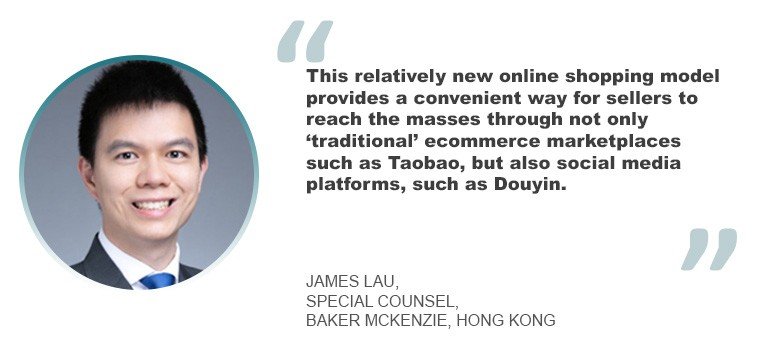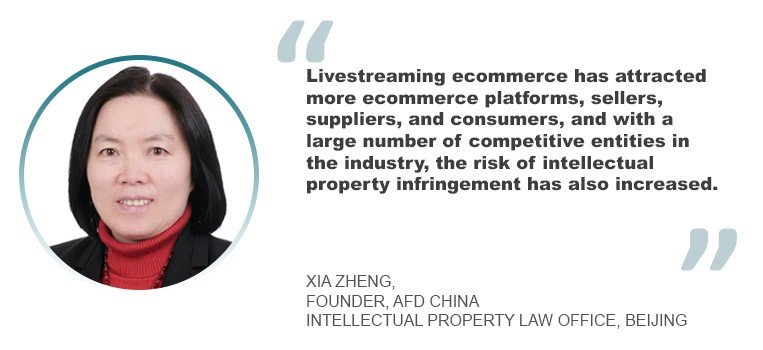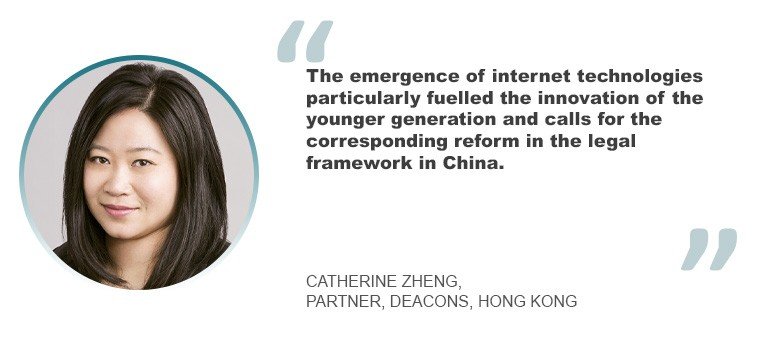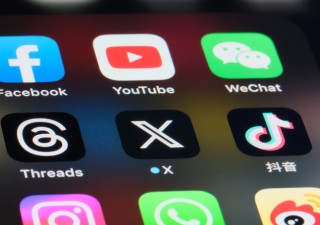Nonetheless, it had once been a grey area as to whether livestreaming platforms would be considered ecommerce platforms, and thus subject to the corresponding ecommerce laws, according to Catherine Zheng, a partner at Deacons in Hong Kong. She quoted as an example the landmark judgment handed down by the Beijing Haidian District Court in Saishi Trading (Shanghai) v. Laizhou Hongyu Art Crafts in May 2021, where livestreaming sales platforms were first recognized as ecommerce platforms. “This particular case concerned a trademark infringement claim arising from a livestreaming sale on Douyin, one of the most popular livestreaming platforms in China. The trademark owner brought proceedings not only against the direct infringer but also the platform. Douyin tried to distinguish itself as a livestreaming platform from an ecommerce platform, on the ground that it merely offered a channel linking consumers to other ecommerce platforms without itself providing any direct sales functions. Nevertheless, the court examined the substance of the sales services provided by Douyin and found it falling within the definition of ecommerce platforms under the ecommerce law, regardless of its primary function of providing livestreaming contents.”
“Despite being subject to the ecommerce laws, Douyin was found to have discharged its duty of care and hence was not jointly liable,” Zheng said. She shared the factors considered by the court: first, whether the platform had rules and policies in place to protect IP rights and notified its users of the same; second, whether the platform had established a prior review mechanism for examining the qualifications of the seller; third, whether the platform had prior notice of the trademark infringement by the seller; and fourth, whether the platform had taken timely and necessary actions to provide information of the seller and take down the relevant contents upon notice of the infringement. “In particular, the court took into account the platform’s difficulty in closely monitoring all the contents and users before being actively notified by a victim of the infringement,” she added.
“In terms of post-infringement actions, livestreaming ecommerce platforms are required to formulate a take-down mechanism to handle IP infringement complaints under the ecommerce law. The failure to discharge this duty can lead to joint liability with the infringer.”
Is IP infringement easier to take place in livestreaming ecommerce compared to conventional retail sales? Xia Zheng believes so, because of the inherent characteristics of livestreaming ecommerce. “In the first aspect, livestreaming currently does not have a strict access mechanism, and among the vast number of participants, some have relatively weak awareness of intellectual property laws.”
“Due to its advantages and policy support, livestreaming ecommerce has attracted more ecommerce platforms, sellers, suppliers, and consumers, and with a large number of competitive entities in the industry, the risk of intellectual property infringement has also increased. Moreover, ecommerce platforms break through the limitations of physical stores in terms of sales time, region, quantity and type of goods for sale to a certain extent. Through the internet, consumers can enter any online store at any time from anywhere and freely choose and buy goods. In this sense, ecommerce triggers almost an indefinite growth in the number of buyers and sellers and the number of commodities and merchants. In terms of probability, the large number of participants can indicate accordingly increased risk of intellectual property infringement.”
Secondly, Zheng said that the immediacy and randomness of livestreaming make it almost impossible to detect and stop infringement in time, and also make it relatively more difficult to preserve and trace evidence. “Compared with traditional ecommerce (which is based on the static display of product information through an internet web page), livestreaming hosts fully release product information in the introduction process and promote the completion of a large number of transactions in a short time under the stimulation of price comparison, livestreaming discount, real-time streaming of sales data and other aspects. The fast pace of livestreaming ecommerce – where the entire sale process happens extremely quickly – creates a significant barrier to IP rights protection. Since ecommerce does not have a physical warehouse or space that limits the number of goods or buyers, the quantity of the goods for sale during livestreaming is so huge that the scrolling of the goods is accelerated, and the product information disappears right after the quick sales are made. The fast-moving appearance and disappearance of the goods make it much more difficult to spot or collect evidence of infringement.”
The third aspect is that the fast and widespread transmission of livestreaming ecommerce makes it more challenging to regulate. Zheng said: “The hastiness and the large population of buyers make it much more laborious for platform maintenance. Ecommerce platforms are faced with managing a colossal seller team and a vast buyer team, which brings significant challenges to their technical and management means for seller review, problem identification and dispute resolution.”
“Unless the product information released by a host contains obvious infringing details or the right holder has sent a warning notice of rights in advance, it is usually tricky for ecommerce platform operators to screen infringing information. Moreover, ecommerce platform operators have limited ability to monitor their massive hosts’ livestreaming words and actions in real time, and the supervision cost is also high.”
Finally, the attribution of livestreaming accounts can be unclear, making rights protection relatively difficult. “Livestreaming ecommerce has complicated legal relations since it involves multiple subjects such as merchants, hosts, and online platforms. It is difficult to directly confirm the identity of the specific seller because consumers are faced with various entities. These can create significant confusion about rights protection, because it is difficult to distinguish who the actual seller is. Further, the responsibilities between companies and hosts are not clearly defined, making it strenuous for dispute resolution,” Zheng said.
In case that owners find that their IP rights are violated by a livestreaming ecommerce channel, how should they act to secure their rights? Catherine Zheng suggested that the right holder may first lodge a complaint to the platform, demanding prohibition of the relevant content or user, and requiring the platform to provide the identity information of the infringer. “Most of the well-developed online platforms would have established an identity authentication system in accordance with the regulatory requirements. Under the ecommerce law and the civil code, the platform will be obliged to take necessary steps to discharge its duty after having notice of the infringement. By complaining to the platform, the right holder may therefore procure the removal of the infringing contents and obtain the identity information of the account operator for taking further actions.”
“In the meantime, the right holder should properly preserve the evidence of the infringement. The right holder may capture and save the screenshots of the infringing products during the livestreaming, record the sales volumes and/or preserve information from any promotional pages. If possible, the right holder may also purchase the infringing products to confirm the infringement details and identify the relevant manufacturer. With the potential legal proceeding in mind, it is advisable to preserve the infringing evidence by a notary public or time stamping in China.”
As livestreaming ecommerce is evolving rapidly in China, apart from learning about the actions they can take after infringement occurs, businesses can also take an advance step to stay better prepared to protect their IP rights. Li advised: “Businesses should pay attention to IP rights, build the IP portfolios according to their own needs, and actively procure the rights of patents, trademarks, copyrights and other intellectual property rights.”
She also advised businesses to pay attention to competitors’ rights acquisition and rights protection behaviours, and do necessary investigations on the market distribution of the suspected infringing products by conducting regular market monitoring etc.
Although there are risks of having your IP rights infringed on the livestreaming ecommerce platforms, there are also plenty of business opportunities on this promising market. Before considering entering this industry, either as a livestreaming host or merchant, Lau advised several points to keep in mind. “From the perspective of the livestreaming hosts, before accepting an engagement, they should first take steps to ensure that they will not become accomplices of IP infringement, such as by promoting counterfeit products. In this regard, the hosts should check the background of the brand to see if it is legitimate business or a copycat, and ensure that the products being promoted are not counterfeits.”
“As for the brands, they should maintain close contact with the livestreaming hosts and agencies, and diligently supervise the work of the hosts. For example, the brands should discuss with the hosts in advance the content and format of the livestream, and regularly remind the hosts not to use any third-party music, photos, pictures or artwork in the livestreams without obtaining relevant authorization. In terms of ensuring that the product information given by the hosts in the livestreams are accurate, the brands should provide adequate product training to the hosts and can also consider providing pre-approved speaking points to the hosts.”
Apart from IP considerations, Lau also advised that brands should be aware of legal issues relating to advertising and consumer protection if they plan to utilize livestreaming ecommerce. “The very nature of livestreaming means that anything said by host will be immediately broadcast to the audience. The host can easily go off-script and make spontaneous remarks, which may be beyond the control of the brand. This could lead to higher risks of hosts inadvertently making false advertising claims or using overly exaggerated or inappropriate language, which may be impermissible under the law.”










